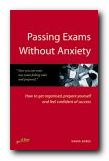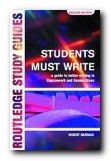guidance notes for success
These exam tips and shortcuts are techniques that anybody can use, without any special preparation or knowledge. They are practical, common-sense approaches to any kind of written exam. Even if you only adopt some of them, you will improve your chances of success.
An extract from our eBook — Revision and Examinations
Before you start
1. Take a selection of differently shaped pens.
2. These can ease the pressure on your fingers and thumbs when writing.
3. Take spares, a ruler, rubber, and any instruments you might need.
4. Settle in as quickly as possible, and avoid distractions.
5. Check the instructions and questions on the exam paper.
6. Confirm that the structure is what you expect [number of questions to be answered, time allocated].
7. Remember that the time allowed includes the time for reading the paper and preparing answers.
The paper
1. Make your choices and get started as quickly as possible.
2. Begin with an overview of the paper.
3. Identify those questions you can answer or prefer to attempt.
4. Eliminate any you can’t answer or prefer to avoid.
5. When you have eliminated questions, you have less material to deal with.
6. Analyse the questions as you would for course work – but do it quickly.
7. Some choices can be made [almost unconsciously] whilst you are writing.
8. Stick to those topics you have revised: don’t try something new.
9. Leave room for making changes as you go along.
Making choices
1. The easiest strategy is to start with your favourite topic.
2. This will give you a sense of confidence, and get your creatives juices flowing.
3. You can also gain marks easily this way.
4. However, you might start with a more difficult question, and save your favourite as a ‘reward’ for later.
5. This strategy has the advantage that you are tackling the more difficult question in a fresher state.
6. Remember that you might have ideas about one topic whilst writing about another.
Making plans
1. Make an outline plan or brief notes for your answer(s) in the exam booklet.
2. This provides guidance and a reminder you can refer to whilst writing.
3. Exam markers might give you credit for a plan if your answer is unfinished.
4. If possible, prepare brief plans for all your answers.
5. You can then add notes or examples as you are going along.
Rules and regulations
1. Some exam booklets might specify that notes should only be written on the outside and inside covers – as in the following example.
“For rough work unruled pages are provided on the cover of the book. If you require more than these, use a ruled page but cross the rough work through before handing the book in.”
2. If regulations permit, write your answers only on right-hand pages.
3. Leave left-hand pages blank for notes, corrections, or later additions.
Under way
1. Write as much as possible on each question.
2. If you finish a question early, either think up more to say or go on to the next question.
3. If you go on to the next question, leave blank space on the page for possible later additions.
4. Firm and concise answers are better than those that wander aimlessly just to fill up the page.
5. Keep an eye on the time allocated for each question.
General
1. Write as clearly as possible: examiners are easily annoyed by untidy writing.
2. It is easier to score the first half of the marks for any question than the second half.
3. A firm structure will help to clarify your arguments.
4. If you finish the paper early, use the time left to check and edit your work.
Answer the question
1. The examiner wants you to answer the question in a clear and simple manner.
2. A plain, direct answer with no frills is easier to mark than one which is ornate or flowery.
3. Getting straight to the point creates a favourable impression.
4. The more concise your answer, the easier it is to mark.
Misconceptions
1. There will not be any ‘hidden traps’ in the questions to catch you out.
2. There isn’t some magical key to unlock the secret of exam success.
3. You don’t have to ‘please’ the examiner – except by answering the question!
4. There isn’t a ‘knack’ to exam success. It’s a combination of hard work, preparation, and clear thinking.
Examiners are human too
1. Marking exam scripts is a very boring task.
2. Judging grades is a subjective and difficult matter.
3. Yes – some exam questions are occasionally hard to understand.
4. [But that means that they are hard for everybody.]
5. Poor writing makes scripts difficult to read.
What examiners DON’T want
1. Untidy work which is difficult to read.
2. Longwinded answers which drift on and off the subject.
3. Answers which have been written to ‘impress’, filled with lots of ill-digested jargon.
4. Too much personal opinion, name-dropping, and generalisation.
How to gain extra credit
1. Get straight to the point. No lengthy introductions.
2. Stay on the subject. No digressions, waffling, or ‘packing’.
3. Relate all parts of your answer to the original question.
4. Show evidence of your knowledge of the subject.
5. Wherever possible, give concrete examples as evidence.
Check your answers
1. Spend the last few moments glancing over what you have written.
2. Check for possible mistakes of fact, grammar, and punctuation.
3. Correct mistakes as neatly as possible. Don’t scribble.
4. Write any additions on the left-hand page, and show insertion points clearly.
5. Make sure your name, ID, and other details are on the cover sheet.
An extract from our eBook — Revision and Examinations
© Roy Johnson 2009
More on How-To
More on study skills
More on writing skills


